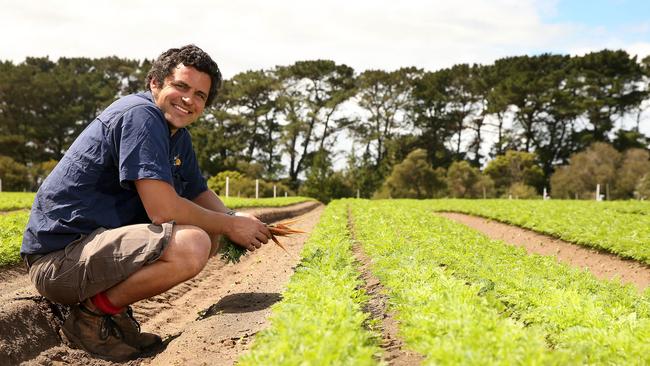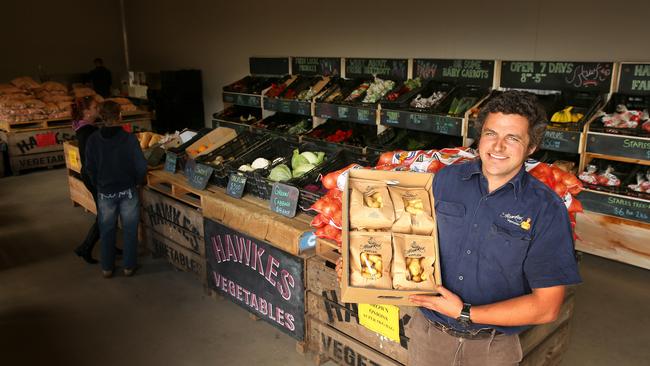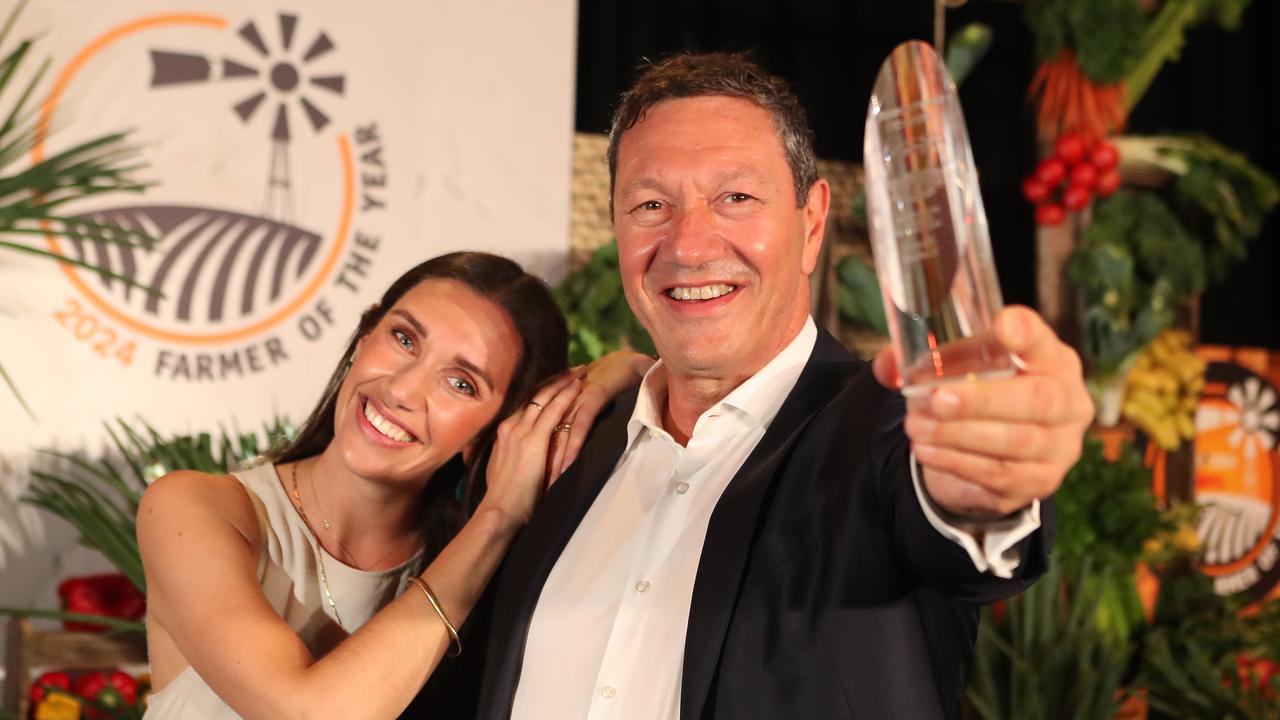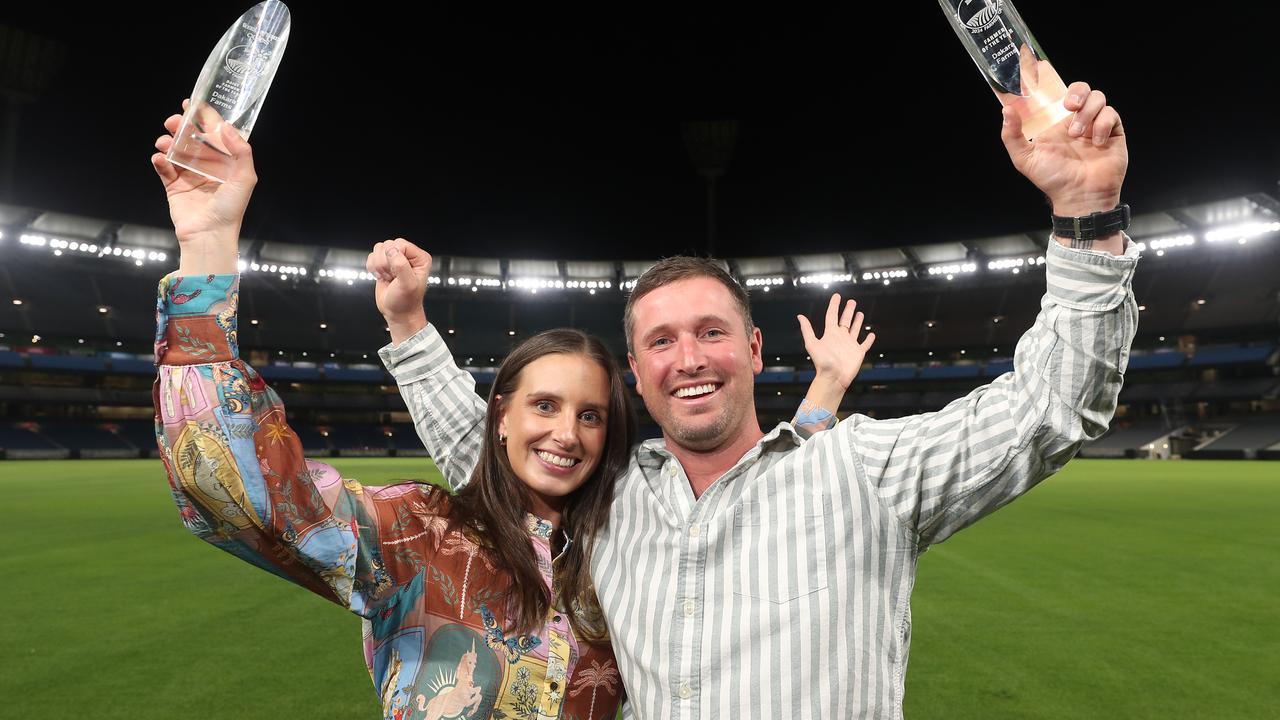Hawkes Vegetables: Mornington Peninsula farmer Richard Hawkes has eyes on the future
THIS innovative Mornington Peninsula farming family shows its vegie might, writes SARAH HUDSON.

THE Hawkes family were small fry when they first became potato farmers in the early 2000s.
Richard Hawkes was working as an agronomist when he decided to grow a small trial patch of potatoes on his family’s 56ha property at Boneo, on Victoria’s Mornington Peninsula.
Now that patch has grown into 16ha with seven varieties — about 80 per cent of which is sold through Sydney and Melbourne wholesale markets, with the remainder sold through a farmgate shop — in addition to their crops of carrots, spring onions, parsley and radish.
This year the family have added a potato washer and polisher to the grading and packing line, processing 2000 tonnes annually, with about 70 per cent of that for other growers.
Their potatoes are marketed through the Hawkes Vegetables brand, while they also market for five other growers (under different brands), selling year-round and sourcing potatoes in the off-season from as far as Queensland’s Atherton Tablelands.
“I was a cocky 21-year-old when I was talking to a potato farmer and thought ‘I can do more tonnes to the acre than that’,” Richard said.
“Up to that point we’d been growing lucerne and so we started with a quarter acre of sebago, learning to grow through observation and making a small profit by selling in our farm shop a little bit above the cost of packing them.”
The 35-year-old — a former Horticulture Australia young leader award recipient — said the growth of the farm has come through practices that lead to high yields, as well as Hawkes Vegetables’ vertical integration, growing, packing and marketing the product, with a total staff of 18.
“If you do just one of those things, there’s not the margin, but if you do all three, it’s a snowball effect and it all adds up,” he said.
FAMILY MATTERS
RICHARD farms with his wife, Georgie, sister Andrea and father Barry, who bought the farm in the early 1970s, with introduced potatoes in 2004. From from next year they will lease an additional 6ha of land.
Given the soil is sandy, Richard said he works hard to retain moisture and nutrients, with crop rotation key to high yields.
This year he invested in a compost spreader, with the farm using 150 cubic metres/ha of homemade compost — a mix of straw and chicken manure.
Compost is applied before planting, which runs from June to mid-January.
“A spreader is an expensive piece of machinery but in the long-term I believe it will pay for itself, because we’ll have happy worms, grow better crops and make more money,” Richard said.
An ideal two-yearly paddock rotation would start with a green-manure crop of broccoli. In the past a break crop has been caliente mustard, but this year Richard has leased land to broccoli growers, in order to get a harvestable crop that provides a boost to organic matter and breaks the weed cycle.
Broccoli is grown for eight weeks, followed by potatoes, then carrots, spring onions, and radish, then repeated.
Kipfler potatoes yield 32 tonnes/ha, with other varieties yielding up to 60 tonnes/ha.
The Hawkes’ next largest line is baby carrots, yielding 59,000 bunches to the hectare, following by spring onions 125,000 bunches/ha, with multiple cuts of parsley, as well as radish and smaller crops of sweet corn and strawberries (next year they are adding you-pick strawberries and farm tours to the property).

TESTING TIME
SOIL is tested annually for nutrition and an agronomist advises on soil needs. “As much as I’d love to be hands on, working as an agronomist, my role is now as a generalist.”
With an annual average rainfall of 450mm, soil is constantly monitored for moisture, with solid set computer-controlled irrigation applying both bore water and class a recycled water from the Eastern Treatment Plant.
He said potato farming on sandy soil was a balance of irrigation and disease pressure — “every time you water you create a disease event, it’s a vicious cycle” — with small amounts of fungicide applied following irrigation.
Potatoes are mechanically harvested, with all other crops picked by hand.
Potatoes are grown from November to August, with cool storage meaning they only have a six-week window each year where they source from further afield, in Queensland.
“It’s marginal, but it keeps the customers happy. Customers want it and no one else is doing a good job of it,” he said.
“I tell my staff if you wouldn’t eat it, don’t use it, which means we have a lot of waste. But I don’t want to give people a reason to move away from us.”
Product from other farmers is washed, polished, graded and packed alongside Hawkes potatoes, but marketed under different brands, and all transported daily to wholesale markets.
Richard is an advocate on agricultural labour market issues, a strong believer in paying staff above-minimum wages, but said it was frustrating that many of his competitors did not play by the same rules. “It’s a massive frustration. My minimum wage is $26.50/hour and I’m competing against farmers who pay $13/hour cash. My bunch lines aren’t growing to maximum capacity because I’m paying the right wages,” he said.
LEARN AND EARN
RICHARD studied agricultural science at Melbourne University and has since taken part in several overseas study tours and exchanges, all of which have fed into his farm knowledge.
He completed his degree on exchange in Canada, where he saw first-hand the benefits of farm gates in small horticultural enterprises.
In 2010 Richard went on an AusVeg grower tour to Europe and Israel to learn about water efficiency.
And when he was working two years for Apple and Pear Australia, in the late 2000s, he went to the US for five weeks with a major apple grower, “which taught me to know your business inside and out”.
“For me it was a key turning point, it cemented what we could do here,” Richard said.
“It was all about quality of product, knowing your costs and margins to make good decisions, that if you spend money to get incremental increases in quality you get money back.”
Richard said he and Georgie spend a lot of time budgeting and forecasting.
“This game is very expensive and you want to make the right move each time. If you rush into things too quickly you can make expensive mistakes,” he said.
“For the past three years I’ve wanted to add a potato washer, but it’s only this year I was confident I could make the repayments.”


